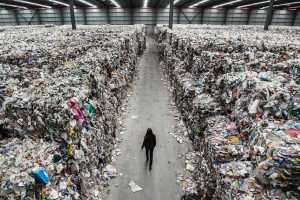Soda manufacturers
Plastic.
March 3, 2020(AUSTRALIA OUT) SKM, a recycling company in Melbourne, has been declared bankrupt and its six major warehouses are full of recyclable materials awaiting processing. This warehouse is located in the industrial suburb of Derrimut. The Victorian Government and the warehouse owners, Marwood Constructions, are unsure how to deal with this material, which is largely unsorted and cannot be sold easily to materials processors. With no one to process their household recycling, Melbourne councils are being forced to send thousands of tonnes of recyclable waste to landfill. (Photo by Jason South/The Age via Getty Images)
Planet Plastic
How Big Oil and Big Soda kept a global environmental calamity a secret for decades
Rolling Stone
TIM DICKINSON
More than half the plastic now on Earth has been created since 2002, and plastic pollution is on pace to double by 2030. At its root, the global plastics crisis is a product of our addiction to fossil fuels. The private profit and public harm of the oil industry is well understood: Oil is refined and distributed to consumers, who benefit from gasoline’s short, useful lifespan in a combustion engine, leaving behind atmospheric pollution for generations. But this same pattern — and this same tragedy of the commons — is playing out with another gift of the oil-and-gas giants, whose drilling draws up the petroleum precursors for plastics. These are refined in industrial complexes and manufactured into bottles, bags, containers, textiles, and toys for consumers who benefit from their transient use — before throwing them away.
“Plastics are just a way of making things out of fossil fuels,” says Jim Puckett, executive director of the Basel Action Network. BAN is devoted to enforcement of the Basel Convention, an international treaty that blocks the developed world from dumping hazardous wastes on the developing world, and was recently expanded, effective next year, to include plastics. For Americans who religiously sort their recycling, it’s upsetting to hear about plastic being lumped in with toxic waste. But the poisonous parallel is apt. When it comes to plastic, recycling is a misnomer. “They really sold people on the idea that plastics can be recycled because there’s a fraction of them that are,” says Puckett. “It’s fraudulent. When you drill down into plastics recycling, you realize it’s a myth.”
Since 1950, the world has created 6.3 trillion kilograms of plastic waste — and 91 percent has never been recycled even once, according to a landmark 2017 study published in the journal Science Advances. Unlike aluminum, which can be recycled again and again, plastic degrades in reprocessing, and is almost never recycled more than once. A plastic soda bottle, for example, might get downcycled into a carpet. Modern technology has hardly improved things: Of the 78 billion kilograms of plastic packaging materials produced in 2013, only 14 percent were even collected for recycling, and just two percent were effectively recycled to compete with virgin plastic. “Recycling delays, rather than avoids, final disposal,” the Science authors write. And most plastics persist for centuries.
Americans who believed they were diverting plastic from the trash were, ironically, fueling a waste crisis half a world away. “It is easy to find American and European packaging polluting the countryside of Southeast Asia,” states a 2019 report from the Break Free From Plastics coalition, which coordinates an annual global audit of plastic waste. “When people in the global north throw something ‘away,’ much of it ends up in the global south because there is no such thing as ‘away.’”
In Washington, the plastics industry is asking government, and American taxpayers, to foot the bill to revitalize the moribund recycling industry. The RECOVER Act — backed by both PLASTICS and the ACC — would offer $500 million in federal-matching funds for investment in new infrastructure. This summer, PLASTICS showed off a demonstration project with high-tech, near-infrared scanning machines that can segregate plastics by their polymer type, improving on human sorters who can’t distinguish between two identical-seeming yogurt cups, each made from different plastics.
The legislation would formally ban the U.S. from exporting plastic waste to developing countries, in alignment with the Basel Convention. Perhaps most controversially, the bill would halt construction of new plastics facilities, giving the EPA time to craft new regulations. Udall insists his bill can return value to the economy, and save consumers a lot of money, noting that every year plastic worth up to $120 billion “is lost after one short use.”
The companies of the plastics industry, Lowenthal says, are ultimately “going to have to deal with the sticker shock that they are now responsible and they’re going to have to pay” to keep plastics out of the environment. The alternative, he insists, has become untenable: “What we have in plastic is something that has made our lives more convenient and easier. But unless we figure out how to keep this out of the waste stream, it’s just going to kill us.”
From Bill McKibbon, environmentalist and founder of 350.org:
‘One of the most damning pieces I’ve ever read, on how Big Oil and Big Soda teamed up to give you Omnipresent UnRecyclable Plastic.’
